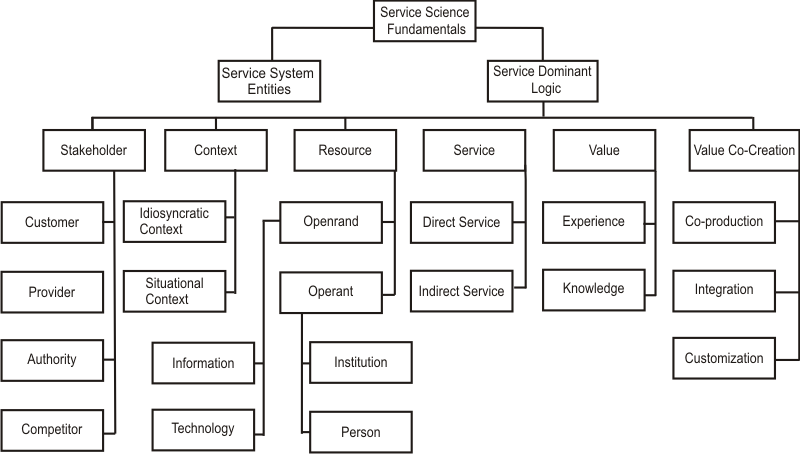From SSKE
| Line 16: | Line 16: | ||
rect 538 202 638 242 [[Experience]] @@@@ | rect 538 202 638 242 [[Experience]] @@@@ | ||
rect 666 202 766 242 [[Co-production]] @@@@ | rect 666 202 766 242 [[Co-production]] @@@@ | ||
| + | |||
| + | |||
| + | rect 4 270 104 310 [[Provider]] @@@@ | ||
| + | rect 125 270 225 310 [[Situational Context]] @@@@ | ||
| + | rect 279 270 379 310 [[Operant]] @@@@ | ||
| + | rect 407 270 507 310 [[Indirect Service]] @@@@ | ||
| + | rect 538 270 638 310 [[Knowledge]] @@@@ | ||
| + | rect 666 270 766 310 [[Integration]] @@@@ | ||
| Line 29: | Line 37: | ||
<div class="pagetab selected new">{{#ask: [[Category:SSKE Knowledge/Document]] [[Category:SSKE Knowledge/Service Science Fundamental]] | format=table | order=ascending | source=wiki | merge=false |}}<br/></div> | <div class="pagetab selected new">{{#ask: [[Category:SSKE Knowledge/Document]] [[Category:SSKE Knowledge/Service Science Fundamental]] | format=table | order=ascending | source=wiki | merge=false |}}<br/></div> | ||
| + | Service systems are value-co-creation configurations of people, technology, value propositionsconnecting internal and external service systems, and shared information (e.g., language, laws, measures, and methods). Service science is the study of service systems, aiming to create a basis for systematicservice innovation. Service science combines organization and human understanding with business andtechnological understanding to categorize and explain the many types of service systems that exist as wellas how service systems interact and evolve to co-create value. The goal is to apply scientific understandingto advance our ability to design, improve, and scale service systems. To make progress, service dominant logic might just provide the right perspective, vocabulary, and assumptions on which to build a theory of service systems, their configurations, and their modes of interaction. | ||
| + | |||
| + | Simply put, service-dominant logic may be the philosophical foundation of service science, and the service system may be its basic theoretical construct. | ||
| + | |||
| + | <br/>'''Publications''' | ||
| + | |||
| + | The following publications address topics related to Service Science Fundamentals. | ||
| + | <div class="pagetab selected new">{{#ask: [[Category:SSKE Knowledge/Document]] [[Category:SSKE Knowledge/Service Science Fundamental]] | format=table | order=ascending | source=wiki | merge=false |}}<br/></div> | ||
Service systems are value-co-creation configurations of people, technology, value propositionsconnecting internal and external service systems, and shared information (e.g., language, laws, measures, and methods). Service science is the study of service systems, aiming to create a basis for systematicservice innovation. Service science combines organization and human understanding with business andtechnological understanding to categorize and explain the many types of service systems that exist as wellas how service systems interact and evolve to co-create value. The goal is to apply scientific understandingto advance our ability to design, improve, and scale service systems. To make progress, service dominant logic might just provide the right perspective, vocabulary, and assumptions on which to build a theory of service systems, their configurations, and their modes of interaction. | Service systems are value-co-creation configurations of people, technology, value propositionsconnecting internal and external service systems, and shared information (e.g., language, laws, measures, and methods). Service science is the study of service systems, aiming to create a basis for systematicservice innovation. Service science combines organization and human understanding with business andtechnological understanding to categorize and explain the many types of service systems that exist as wellas how service systems interact and evolve to co-create value. The goal is to apply scientific understandingto advance our ability to design, improve, and scale service systems. To make progress, service dominant logic might just provide the right perspective, vocabulary, and assumptions on which to build a theory of service systems, their configurations, and their modes of interaction. | ||
Revision as of 02:38, 5 July 2012

Service systems are value-co-creation configurations of people, technology, value propositionsconnecting internal and external service systems, and shared information (e.g., language, laws, measures, and methods). Service science is the study of service systems, aiming to create a basis for systematicservice innovation. Service science combines organization and human understanding with business andtechnological understanding to categorize and explain the many types of service systems that exist as wellas how service systems interact and evolve to co-create value. The goal is to apply scientific understandingto advance our ability to design, improve, and scale service systems. To make progress, service dominant logic might just provide the right perspective, vocabulary, and assumptions on which to build a theory of service systems, their configurations, and their modes of interaction.
Simply put, service-dominant logic may be the philosophical foundation of service science, and the service system may be its basic theoretical construct.
Publications
The following publications address topics related to Service Science Fundamentals.
Service systems are value-co-creation configurations of people, technology, value propositionsconnecting internal and external service systems, and shared information (e.g., language, laws, measures, and methods). Service science is the study of service systems, aiming to create a basis for systematicservice innovation. Service science combines organization and human understanding with business andtechnological understanding to categorize and explain the many types of service systems that exist as wellas how service systems interact and evolve to co-create value. The goal is to apply scientific understandingto advance our ability to design, improve, and scale service systems. To make progress, service dominant logic might just provide the right perspective, vocabulary, and assumptions on which to build a theory of service systems, their configurations, and their modes of interaction.
Simply put, service-dominant logic may be the philosophical foundation of service science, and the service system may be its basic theoretical construct.
Publications
The following publications address topics related to Service Science Fundamentals.
Service systems are value-co-creation configurations of people, technology, value propositionsconnecting internal and external service systems, and shared information (e.g., language, laws, measures, and methods). Service science is the study of service systems, aiming to create a basis for systematicservice innovation. Service science combines organization and human understanding with business andtechnological understanding to categorize and explain the many types of service systems that exist as wellas how service systems interact and evolve to co-create value. The goal is to apply scientific understandingto advance our ability to design, improve, and scale service systems. To make progress, service dominant logic might just provide the right perspective, vocabulary, and assumptions on which to build a theory of service systems, their configurations, and their modes of interaction.
Simply put, service-dominant logic may be the philosophical foundation of service science, and the service system may be its basic theoretical construct.
Publications
The following publications address topics related to Service Science Fundamentals.
Service systems are value-co-creation configurations of people, technology, value propositionsconnecting internal and external service systems, and shared information (e.g., language, laws, measures, and methods). Service science is the study of service systems, aiming to create a basis for systematicservice innovation. Service science combines organization and human understanding with business andtechnological understanding to categorize and explain the many types of service systems that exist as wellas how service systems interact and evolve to co-create value. The goal is to apply scientific understandingto advance our ability to design, improve, and scale service systems. To make progress, service dominant logic might just provide the right perspective, vocabulary, and assumptions on which to build a theory of service systems, their configurations, and their modes of interaction.
Simply put, service-dominant logic may be the philosophical foundation of service science, and the service system may be its basic theoretical construct.
Publications
The following publications address topics related to Service Science Fundamentals.
Service systems are value-co-creation configurations of people, technology, value propositionsconnecting internal and external service systems, and shared information (e.g., language, laws, measures, and methods). Service science is the study of service systems, aiming to create a basis for systematicservice innovation. Service science combines organization and human understanding with business andtechnological understanding to categorize and explain the many types of service systems that exist as wellas how service systems interact and evolve to co-create value. The goal is to apply scientific understandingto advance our ability to design, improve, and scale service systems. To make progress, service dominant logic might just provide the right perspective, vocabulary, and assumptions on which to build a theory of service systems, their configurations, and their modes of interaction.
Simply put, service-dominant logic may be the philosophical foundation of service science, and the service system may be its basic theoretical construct.
Publications
The following publications address topics related to Service Science Fundamentals.



